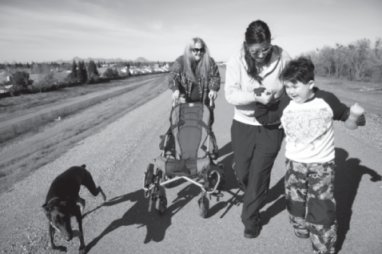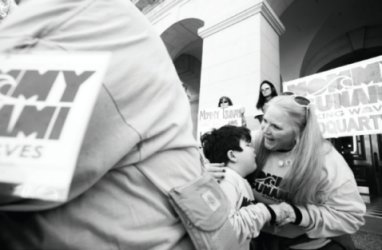Each year 44 million family caregivers in the U.S. provide critical support to adults with a chronic, disabling, or otherwise serious health condition. AARP and the Asian American Journalists Association (AAJA) partnered to bring to light personal journeys of AAJA members or accounts of other Asian American and Pacifi c Islanders who have been impacted by caregiving for a loved one.
The winning works include: Best Video: Filmmaker and former sportscaster Rick Quan produced When the Music Stops, a moving short fi m about Dorlie Fong, the daughter of legendary dancer Dorothy Toy. Dorlie describes how she copes with caring for her 101-year-old mother who has Alzheimer’s. Caregivers for people living with Alzheimer’s and other forms of dementia face the normal stresses of caregiving as well as unique challenges. Dorlie shares how she built her physical emotional stamina to meet the challenge of taking care of her mother who suffers from severe memory loss. Best Essay: Chris Lee’s* very personal essay, “Self-Care for the Secret Caregiver,” is about her secret struggle to care for her mother battling cancer. When her mother was diagnosed, she didn’t tell anyone and only admitted it much later to Chris when she let her accompany her to a doctor’s visit. Over a year later, it remains a secret, and Chris often tells others that her mother is helping her care for her young son, even though the bulk of time together is actually spent on her mom’s healthcare needs.
Best Photo Essay: Photographer Colleen Cummins’ photos entitled “The Caregiver” chronicle the daily life of Alex and his grandmother Mary in Yuba City, CA. Alex’s chromosomal microduplication limits his mobility and suffers from severe allergies which can cause him to go into anaphylactic shock. Mary has been Alex’s primary caregiver for 9 years since he was an infant, and her only free time is when Alex is at school where he has a one-onone paraeducator. Driven by fears of budget cuts to California’s Lanterman Act, the 1977 state law that provides the developmentally disabled with the right to services, Mary became activist “Mommy Tsunami” and organized a march within the disabled community near the state capitol in Sacramento. “Through AAJA’s partnership with AARP, we are able to highlight the complexities and challenges of caring for a loved one. They are three stories of many. We hope that these caregiving stories serve as an inspiration and support for other caregivers, and we thank AARP for continuing to provide information and resources for caregivers,” said Michelle Ye Hee Lee, AAJA President and Washington Post reporter. An AARP study found that the vast majority (73%) of AAPIs, more than any racial or ethnic group, believe that caring for parents is expected of them. The study found that AAPIs were more likely to take charge of caregiving for their elders: they are more likely to talk to doctors, contribute financially, and handle paper work or bills than the total population of the same age.


Photos from the 2018 winning photo essay “Th e Caregiver” by Colleen Cummins
 VIA Times – July 2019 Issue Vital News, Vibrant VIews for Asian Americans in Chicago & Midwest
VIA Times – July 2019 Issue Vital News, Vibrant VIews for Asian Americans in Chicago & Midwest

